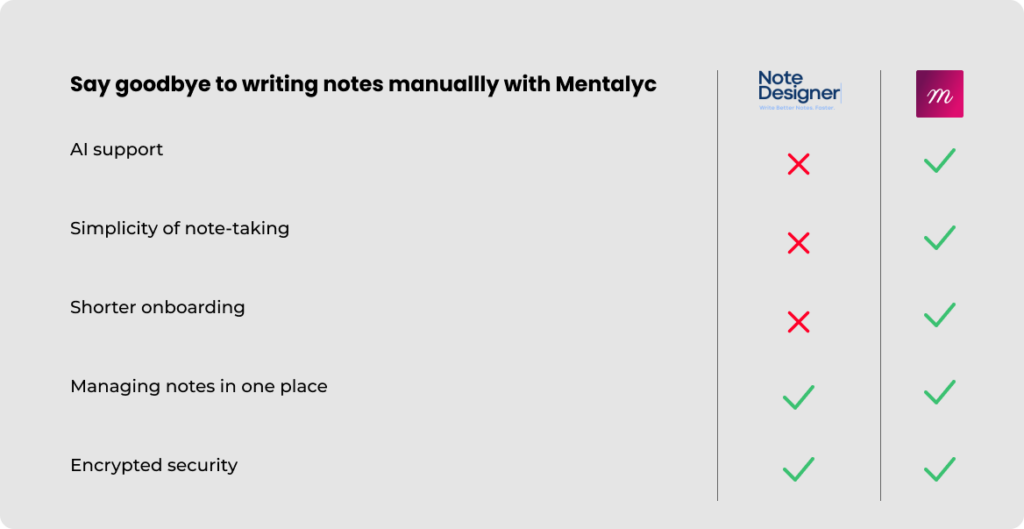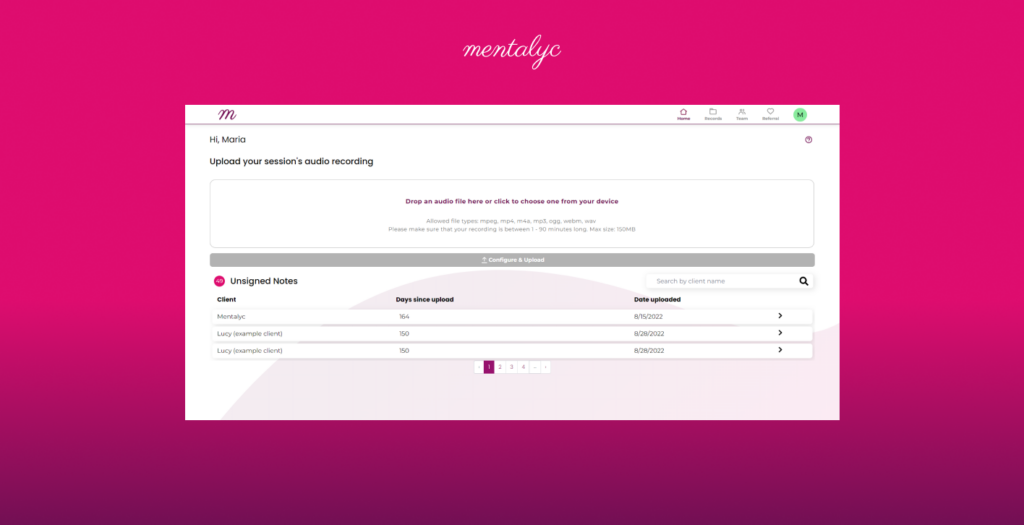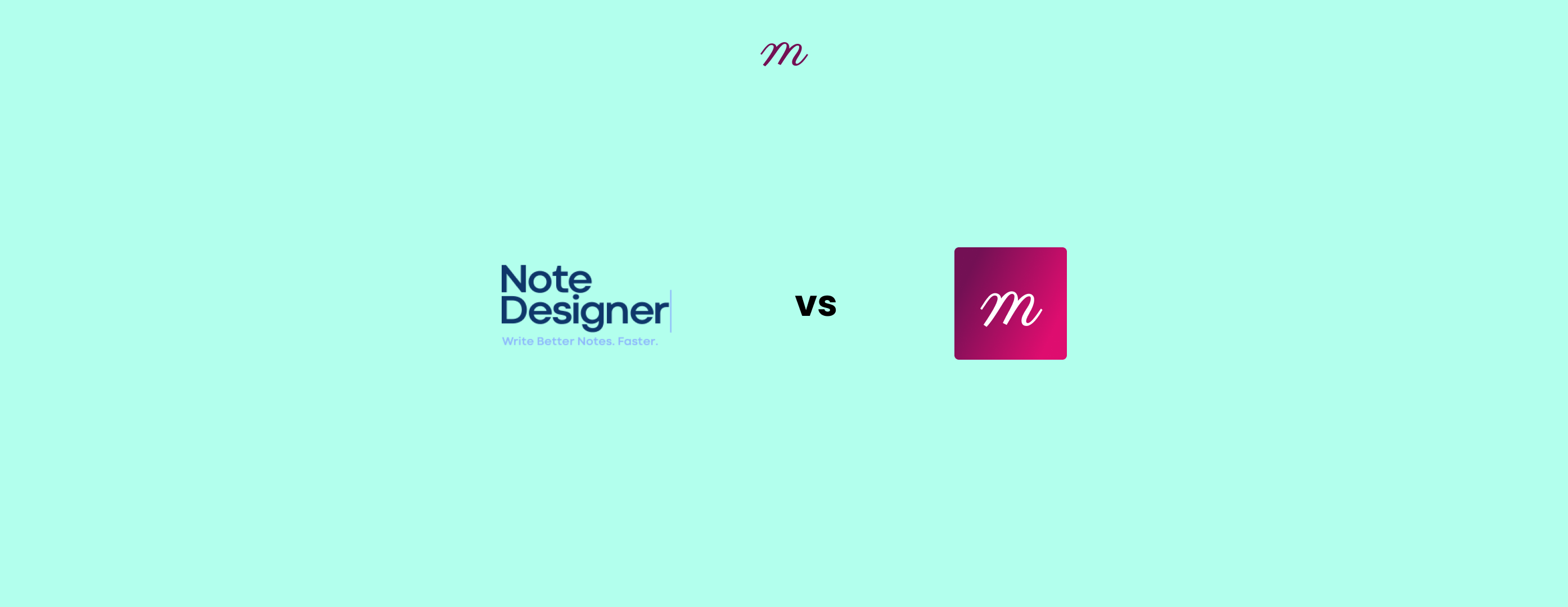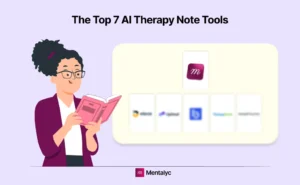Mentalyc and Note Designer are two of the popular tools used by therapists for note-taking and client management. Both tools offer features to help therapists keep track of their client’s progress and provide better care.
Purpose of Comparing Mentalyc and Note Designer
This article aims to compare Mentalyc and Note Designer in detail, highlighting the unique features of each tool and how they can benefit therapists. By understanding the differences between the two tools, therapists can make informed decisions on which tool best suits their needs and goals in therapy practice.
Mentalyc
Overview of Mentalyc
Mentalyc is a note-taking platform designed specifically for therapists. It uses AI technology to create high-quality psychotherapy notes, freeing therapists from the manual task of taking notes during sessions.
Key Features of Mentalyc
- Secure storage: Mentalyc stores all notes securely with a high level of security, ensuring that sensitive client information is protected.
- Automated note-taking: Mentalyc automates the note-taking process, saving therapists time and effort by automatically creating high-quality notes based on session audio recordings.
- Privacy: Mentalyc prioritizes client privacy and does not collect or store any client data, ensuring all notes are fully anonymized and safe. Mentalyc is HIPPA compliant.
- Easy interface: Mentalyc offers one of the easiest user interfaces, making it simple and seamless for therapists to navigate and use, providing excellent user experience.
Note Designer
Overview of Note Designer
Note Designer is a web-based note-taking and client management platform specifically designed for therapists. It offers a range of features that make it easier for therapists to keep track of their client’s progress and provide better care.

New! Transfer your notes to EHR with a single click. No more copy-pasting.
Key Features of Note Designer
- Secure client data storage: Note Designer stores all client data securely in the cloud, ensuring easy access from any device.
- Customizable templates: Note Designer provides customizable templates that therapists can use to quickly create notes for their clients. These templates can be tailored to the specific needs of the therapist and their clients, making it easier to track progress and provide better care.
Comparison

Comparison of Key Features
- Security
- Both Mentalyc and Note Designer offer secure storage of notes, but Mentalyc’s unique design of not requiring client information ensures that client notes are fully anonymous and secure.
2. Automation
- Both tools offer solutions to manual note-taking, but Mentalyc offers a more advanced automation feature by fully automating the process using AI. Note Designer still requires the therapist to select the information to include in the notes.
3. Customization
- Note Designer offers customizable templates for creating notes, while Mentalyc offers the ability to easily edit and customize notes. This may make Mentalyc a better choice for therapists who need to tailor their notes to fit their specific needs.

Conclusion
Summary of Key Differences
Mentalyc and Note Designer are both popular tools used by therapists for note-taking and client management. Both offer a range of features that make it easier for therapists to keep track of their client’s progress and provide better care. However, there are some key differences between the two tools that make them better suited for different types of therapists.
When it comes to security, both Mentalyc and Note Designer offer secure storage of notes. However, Mentalyc does not require any client information, which ensures that client notes are anonymized and fully secure. This makes Mentalyc a better option for therapists who value their clients’ privacy.
In terms of automation, both tools offer solutions to manual note-taking, but Mentalyc offers more advanced automation features, fully automating the process using AI. This makes Mentalyc a better choice for therapists who need to manage multiple clients and take a lot of notes in a short time.
With regards to customization, Note Designer offers customizable templates that can be used to quickly create notes, while Mentalyc offers the ability to edit notes quickly and easily. This makes Mentalyc a better choice for therapists who need to customize their notes to fit their specific needs.
Final Recommendation for Therapists
In conclusion, if you’re a therapist looking for a tool to write quick and high-quality notes, Mentalyc is the best option for you. With its advanced automation features and ability to quickly and easily edit notes, Mentalyc is a standout choice for therapists who need to manage multiple clients and take a lot of notes in a short time.
Why other mental health professionals love Mentalyc

“A lot of my clients love the functionality where I can send them a summary of what we addressed during the session, and they find it very helpful and enlightening.”
Therapist

“It’s so quick and easy to do notes now … I used to stay late two hours to finish my notes. Now it’s a breeze.”
Licensed Professional Counselor

“Having Mentalyc take away some of the work from me has allowed me to be more present when I’m in session with clients … it took a lot of pressure off.”
LPC

“By the end of the day, usually by the end of the session, I have my documentation done. I have a thorough, comprehensive note … It’s just saving me hours every week.”
CDCII






